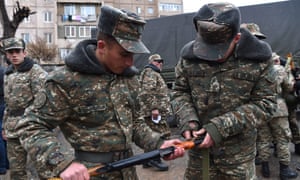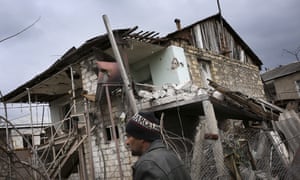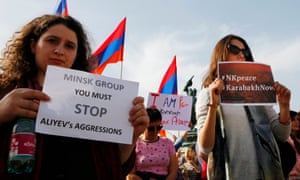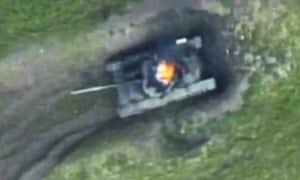
A ceasefire has been announced in the breakaway region of Nagorno-Karabakh after four days of intense fighting that has left dozens dead and threatened to degenerate into full-blown war between Armenia and Azerbaijan.
Karabakh is technically part of Azerbaijan but has been run by an ethnic Armenian government ever since the Soviet Union collapsed. Azerbaijan said 16 servicemen were killed in the past 48 hours, while the separatist Karabakh authorities said 20 of its troops had died and also reported civilian casualties.
The ceasefire announcement on Tuesday came amid diplomatic pressure to stop the fighting, with fears the localised clashes could spiral into a wider conflict between Armenia and Azerbaijan, and possibly even a proxy war involving Russia and Turkey.
Armenia and Azerbaijan fought a war over Karabakh as both became independent countries when the Soviet Union collapsed. There was widespread violence as Armenians living in Azerbaijan’s capital, Baku, were driven out and ethnic Azeris in Karabakh were forced to flee. By the time a ceasefire was agreed in 1994 at least 25,000 people were believed to have been killed and hundreds of thousands displaced from their homes. Since then, the two countries have no diplomatic links and strained relations.
Since 1994, an uneasy truce has held, with Armenian and Azerbaijani soldiers facing off against each other from muddy trenches a few hundred metres apart. There are frequent minor skirmishes along the line of control but the recent violence has been the worst since the war ended. Armenia has stopped short of recognising Karabakh as independent, but provides military and financial support to the territory. A comprehensive settlement has proved elusive as both countries’ presidents fear losing face in any deal.
Azerbaijan, buoyed until recently by windfall profits from oil sales, has spent billions of pounds on modern weapons systems, mainly purchased from Russia, and has refused to rule out a military solution to the conflict. Armenia has also bolstered its military capacity.
This week, Azerbaijan’s defence minister, Zakir Hasanov, said his troops had been instructed to target Karabakh’s capital, Stepanakert, if the separatist forces continued to shell Azerbaijani settlements, while Karabakh authorities promised a “crushing response” if this happened.
Though a ceasefire has been declared, it is too early to say whether it will hold on the ground. Thomas de Waal, senior associate at Carnegie Europe and author of a book on Karabakh, said: “The problem with the geography of this conflict is that if the ceasefire breaks down there are no peacekeepers and even if you don’t have a full-scale war there could be low-intensity fighting which completely destroys the peace process.”

The danger of escalation is real, with both societies having been fed militaristic propaganda for the past two decades, said De Waal, but added that international pressure may be enough to stop the conflict from escalating into a full-blown war.
“The Azeris know that if they go for all-out war it will be tossing all the oil profits of the past decade on to the roulette wheel, and in the last six months they have been seeking international loans due to the drop in oil prices, so there is leverage there,” he added.
A further complication is the potential for the regional dispute to spill into a proxy conflict between Russia and Turkey, whose relations have deteriorated since Turkish fighter jets shot down a Russian plane it said infringed on its airspace last November.
Russia has treaty obligations to Armenia and would be required to defend it if it were attacked, while Turkey has traditionally supported Azerbaijan. While president Recep Tayyip Erdoğan has usually been measured on the Karabakh issue, in recent days he and other top officials have made a number of strong statements of support for Azerbaijan.

On Tuesday, Turkey’s prime minister, Ahmet Davutoğlu, reaffirmed his country’s support for Baku. “Let the whole world know that Turkey will be shoulder to shoulder with Azerbaijan until the end of time,” he said. “We will continue supporting Azerbaijan on all issues, including Nagorno-Karabakh, until all its lands are liberated.”
Envoys from Russia, France and the USwere planning a trip to the region to attempt to begin negotiations. Minsk Group, which mediates in the conflict, said: “The deterioration of the situation on the ground demonstrates the need for an immediate negotiation … on a comprehensive settlement.”
The Russian foreign minister, Sergei Lavrov, will travel to Azerbaijan’s capital Baku on Thursday while the prime minister, Dmitry Medvedev, is due in Armenia’s Yerevan, in a further attempt to allay the tensions.
[Source:- The Guardian ]






